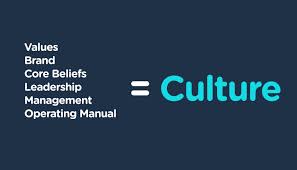
06
JUL
Creating Company Culture
What is Company Culture?
Company culture is the personality of a company. It describes the environment in which your employees work in. Company culture includes a variety of components, including work environment, company mission, value, ethics and expectations.
The workplace should not be something that people dread every day. Employees should look forward to going to their jobs. While the work may be difficult, the culture shouldn’t add to the stress of the everyday workload.
What defines Company Culture?
From hiring practices to how people work, making decisions, resolving differences of opinions and navigating change, the culture defines the unwritten but very real rules of behaviour.
A lot of this behaviour begins with management, how they are handling situations and how they value their staff. Company culture can have a huge impact on is worker productivity. If there is no effort made to make employees feel like they are appreciated, employees of course will have little reason to put in the strongest effort every day.
How would employees describe the culture within your business?
Cultures are either created organically or through deliberate and consistent planning and action. Would your staff regard the work place as a fun place to work? or we are results oriented office? On the negative side would you more likely hear you can’t speak up without fear of retribution or I don’t feel trusted to do my job?
A positive culture in the company means it values its employees and respects their contribution. This helps in creating a positive workplace for the employees where they feel acknowledged and valued and hence work happily.
How to set out a good company culture.
Culture starts with hiring. In your interview with a candidate, be open and specific about your company values, and describe your values, as far as how they direct the culture you are creating. It is worth asking the candidate a few questions about how they understand these values, and what they believe these values mean. This all helps to better assess candidate suitability.
Define common values and standards.
You must also have a common set of values, which are your company’s principles, and a common set of standards which will measure how your principles are being upheld.
Lead by example.
A culture is shaped by how a company’s leaders act. You shouldn’t recite the mission statement as a solution to everything but should exemplify what the company stands for.
Be truthful and always communicate.
Integrity has been defined as “doing the right thing, even when nobody’s watching.” Whatever you do, you must always demand that everyone in your company adhere to being truthful and approach everything with the utmost integrity. Failure to comply is not an option.
Remember that the best culture makes all employees feel safe and welcome, never excluded or uncomfortable. Focusing on “culture fit” alone makes it difficult to hire and welcome employees who are different than the prevailing culture, even if they’d be an asset and great counterbalance at your company.
Below are the companies who are getting it right
Google: with roughly 3 million resumes received per year, Google is one of the most sought employers today. And one of the best examples for what a strong company culture can do. Overall, Google has been rated as the best place to work for repeatedly in various rankings. And it’s not just the perks: free food, massages, sports courts, cool office space and good pay.
Zappos: hires according to cultural fit first and foremost. It has established what the company culture is, and fitting into that culture is the most important thing managers look for when hiring. This promotes the culture and happy employees, which ultimately leads to happy customers.
Auto Trader: “An important part of our culture is to address negative behaviour in a timely manner, so all managers take responsibility for this.”
Cloudreach: At Cloudreach, managers “lead rather than manage. The difference for us is that a leader truly inspires and engages those who follow them”.
Posted by
Office 2, 12A Lower Main Street, Lucan, Co Dublin, K78 X5P8 Ireland
Date06/Jul/2018